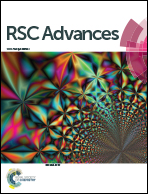Efficient preparation of crack-free, low-density and transparent polymethylsilsesquioxane aerogels via ambient pressure drying and surface modification
Abstract
Polymethylsilsesquioxane (PMSQ) aerogels have gained considerable attention due to their high transparency, good mechanical properties and low thermal conductivity. However, low-density PMSQ aerogels are difficult to obtain by ambient pressure drying due to irreversible shrinkage. Inspired by previous research, we speculate that reducing surface silanol groups could reduce irreversible shrinkage along with the skeleton-strengthening effect. In addition, extending the ageing process is expected to lead to increased density. Thus, in this paper, we applied a mature technique to modify the surfaces of PMSQ gels with terminal silane groups to reduce hydrophilic surface silanol groups without strengthening the skeletons. This surface modification process greatly reduced irreversible shrinkage and allowed the PMSQ gels to return to their original sizes, in accompany with the decrease of silanol group (NMR results as the direct evidence). This method exhibits extremely high efficiency in the preparation of crack-free, low-density and transparent PMSQ aerogels. The PMSQ aerogels dried at ambient pressure had a low density of 48 mg cm−3, low thermal conductivity (21.1 mW m−1 K−1), high transparency (81.3% at 550 nm), super-hydrophobicity (contact angle of 155°) and excellent mechanical properties. The proposed method will be useful for the industrial production of transparent insulating materials and has potential applications in space exploration.



 Please wait while we load your content...
Please wait while we load your content...